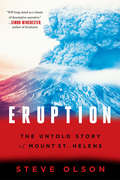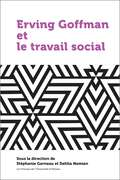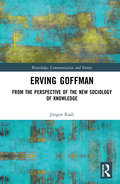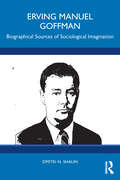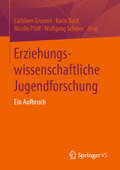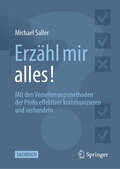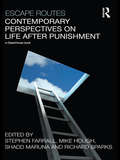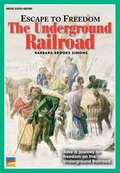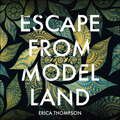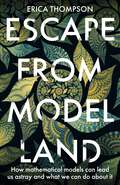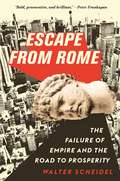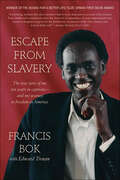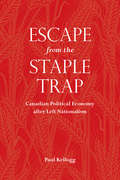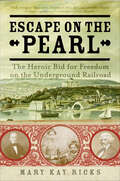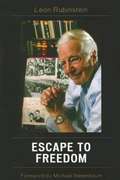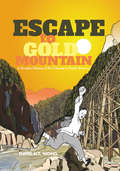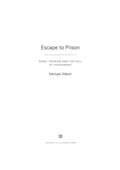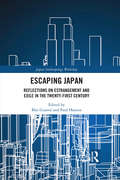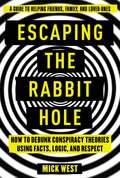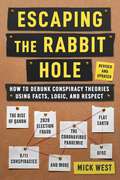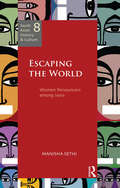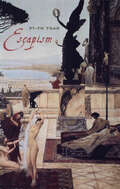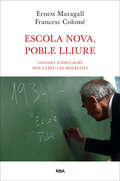- Table View
- List View
Eruption: The Untold Story of Mount St. Helens
by Steve OlsonSurvival narrative meets scientific, natural, and social history in the riveting story of a volcanic disaster. For months in early 1980, scientists, journalists, sightseers, and nearby residents listened anxiously to rumblings in Mount St. Helens, part of the chain of western volcanoes fueled by the 700-mile-long Cascadia fault. Still, no one was prepared when an immense eruption took the top off of the mountain and laid waste to hundreds of square miles of verdant forests in southwestern Washington State. The eruption was one of the largest in human history, deposited ash in eleven U.S. states and five Canadian provinces, and caused more than one billion dollars in damage. It killed fifty-seven people, some as far as thirteen miles away from the volcano’s summit. Shedding new light on the cataclysm, author Steve Olson interweaves the history and science behind this event with page-turning accounts of what happened to those who lived and those who died. Powerful economic and historical forces influenced the fates of those around the volcano that sunny Sunday morning, including the construction of the nation’s railroads, the harvest of a continent’s vast forests, and the protection of America’s treasured public lands. The eruption of Mount St. Helens revealed how the past is constantly present in the lives of us all. At the same time, it transformed volcanic science, the study of environmental resilience, and, ultimately, our perceptions of what it will take to survive on an increasingly dangerous planet. Rich with vivid personal stories of lumber tycoons, loggers, volcanologists, and conservationists, Eruption delivers a spellbinding narrative built from the testimonies of those closest to the disaster, and an epic tale of our fraught relationship with the natural world.
Erving Goffman et le travail social (21e – Société, histoire et cultures)
by Stéphanie Garneau & Dahlia NamianEn ces temps de morcèlement et de cloisonnement disciplinaire, il est impératif de rappeler les liens ambigus, mais néanmoins enchevêtrés, entre le travail social et la tradition sociologique dont est issu Erving Goffman. Les auteurs de cet ouvrage – travailleurs sociaux, sociologues, anthropologues, politistes et infirmiers – ouvrent la « boîte à outils goffmanienne », offrant des regards novateurs sur les enjeux contemporains entourant le travail social. Il prend appui sur une pluralité d’objets, dont la santé mentale, la toxicomanie, les soins aux personnes âgées ou avec un handicap, et l’aide aux sans-abris. Que ce soit sous l’angle épistémologique, théorique, méthodologique ou pratique, la posture goffmanienne est digne de considération. Elle permet d’observer les effets des institutions et des catégories du travail social sur les personnes ciblées. Elle aide à sortir d’une vision normative de l’intervenant pour identifier les possibilités et les contraintes qui pèsent sur lui. Elle permet également d’accéder aux dimensions tacites, affectives et parfois insoupçonnées du social et de la relation d’aide dans le but de rendre visible l’invisible, de rendre intolérable le toléré et les allant-de-soi. Les dix-sept collaborateurs rattachent certaines des ficelles qui ont été dénouées entre les deux disciplines au fil des luttes visant leur reconnaissance institutionnelle.Publié en français
Erving Goffman: From the Perspective of the New Sociology of Knowledge (Knowledge, Communication and Society)
by Jürgen RaabWhile Erving Goffman’s books are among the most widely read sociological works, covering issues including the presentation of the self, total institutions, interaction order to frame analysis, they are in fact guided by a single theme: the analysis of the form of interaction in social situations and the role that individuals play in it. This book stresses Goffman’s central role as a sociological theorist, exploring the potentials of his work and uncovering the recondite layers of his oeuvre. In opening a path to understanding the complexity of his writings, it offers new directions for social theory and empirical research.
Erving Manuel Goffman: Biographical Sources of Sociological Imagination
by Dmitri N. ShalinErving Goffman is the most cited American sociologist. There is no shortage of studies exploring Goffman’s scholarship but no extant biography of Erving Goffman. The chief reason is that a man who looked behind the facades people erect to protect their private selves, zealously guarded his own backstage. This book is the first comprehensive biography of Goffman, an intellectual of Russian-Jewish descent, who turned the “Potemkin village” trope into a powerful research program. The present study shows how key turns in Goffman’s career reflected dramatic events in his family and personal history. It is based on the materials gathered in the Erving Goffman Archives, a repository curated by the author who has been collecting documents and conducting interviews with Goffman’s relatives, colleagues, and friends. The archival work turned up documents which improve our understanding of Goffman the scholar, the teacher, and the man. The approach adopted in this investigation sheds new light on Goffman’s scholarship which has had an enormous and continuous impact across the social sciences and humanities.
Erziehungswissenschaftliche Jugendforschung: Ein Aufbruch
by Cathleen Grunert Wolfgang Schröer Nicolle Pfaff Karin BockDer Band geht der Frage nach, welche aktuelle Bedeutung die Jugendforschung in der Erziehungswissenschaft hat. In den Beiträgen wird diskutiert, wie das Gegenstandsfeld Jugend in der Erziehungswissenschaft aktuell konturiert ist und mit welchen theoretischen und methodischen Zugängen es bearbeitet wird. Darüber hinaus wird untersucht, wie die Jugendforschung in die verschiedenen subdisziplinären Zusammenhänge und nachbardisziplinären Bezüge eingebunden ist und vor welche jugend-, forschungs- und disziplinpolitischen Herausforderungen eine erziehungswissenschaftlich orientierte Jugendforschung aktuell gestellt ist.
Erzähl mir alles!: Mit den Vernehmungsmethoden der Profis effektiver kommunizieren und verhandeln
by Michael SallerDieses Buch bietet Einblicke in die speziellen Techniken, mit denen Profis bei Vernehmungen und Befragungen die gewünschten Informationen erhalten, und erklärt, wie sie für die tägliche Kommunikation genutzt werden können. Der erste Teil erläutert die Unterschiede zwischen Vernehmung und Befragung, stellt Methoden zur Bewertung von Aussagen vor und diskutiert zwei prominente Fälle aus dem Strafrecht (Kachelmann, Mollath). Der zweite Teil konzentriert sich auf bewusste Lügen von Befragten und beschreibt, wie die Glaubwürdigkeit von Personen und die Glaubhaftigkeit von Aussagen methodisch analysiert werden. Der dritte Teil behandelt den Umgang mit Erinnerungen und Irrtümern bei Zeugenaussagen. Der vierte Teil zeigt ein sechsphasiges Modell der effizienten Informationsgewinnung mit praktischen Beispielen und bietet 30 Expertentipps für informativere Gespräche.
Escape Routes: Contemporary Perspectives On Life After Punishment
by Stephen FarrallEscape Routes: Contemporary Perspectives on Life After Punishment addresses the reasons why people stop offending, and the processes by which they are rehabilitated or resettled back into the community. Engaging with, and building upon, renewed criminological interest in this area, Escape Routes nevertheless broadens and enlivens the current debate. First, its scope goes beyond a narrowly-defined notion of crime and includes, for example, essays on religious redemption, the lives of ex-war criminals, and the relationship between ethnicity and desistance from crime. Second, contributors to this volume draw upon a number of areas of contemporary research, including urban studies, philosophy, history, religious studies, and ethics, as well as criminology. Examining new theoretical work in the study of desistance and exploring the experiences of a number of groups whose experiences of life after punishment do not usually attract much attention, Escape Routes provides new insights about the processes associated with reform, resettlement and forgiveness. Intended to drive our understanding of life after punishment forward, its rich array of theoretical and substantive papers will be of considerable interest to criminologists, lawyers, and sociologists.
Escape To Freedom: The Underground Railroad
by Barbara Brooks SimonsNIMAC sourced supplemental reading
Escape from Model Land: How Mathematical Models Can Lead Us Astray and What We Can Do About It
by Erica ThompsonHow do mathematical models shape our world - and how can we harness their power for good?Models are at the centre of everything we do. Whether we use them or are simply affected by them, they act as metaphors that help us better understand the increasingly complex problems facing us in the modern world. Without models, we couldn't begin to tackle three of the major challenges facing modern society: regulation of the economy, climate change and the COVID-19 pandemic. Yet in recent years, the validity of the models we use has been hotly debated and there has been renewed awareness of the disastrous consequences when the makers and interpreters of models get things wrong.Drawing on contemporary examples from finance, climate and health policy, Erica Thompson explores what models are, why we need them, how they work and what happens when they go wrong. This is not an audiobook that argues we should do away with models, but rather, that we need to properly understand how they are constructed - and how some of the assumptions that underlie the models we use can have significant unintended consequences. Unexpectedly humorous, thought-provoking and passionate, this is essential listening for everyone.(P) 2022 Hodder & Stoughton Limited
Escape from Model Land: How Mathematical Models Can Lead Us Astray and What We Can Do About It
by Erica Thompson'A brilliant account of how models are so often abused and of how they should be used' John KayHow do mathematical models shape our world - and how can we harness their power for good?Models are at the centre of everything we do. Whether we use them or are simply affected by them, they act as metaphors that help us better understand the increasingly complex problems facing us in the modern world. Without models, we couldn't begin to tackle three of the major challenges facing modern society: regulation of the economy, climate change and the COVID-19 pandemic. Yet in recent years, the validity of the models we use has been hotly debated and there has been renewed awareness of the disastrous consequences when the makers and interpreters of models get things wrong.Drawing on contemporary examples from finance, climate and health policy, Erica Thompson explores what models are, why we need them, how they work and what happens when they go wrong. This is not a book that argues we should do away with models, but rather, that we need to properly understand how they are constructed - and how some of the assumptions that underlie the models we use can have significant unintended consequences. Unexpectedly humorous, thought-provoking and passionate, this is essential reading for everyone.
Escape from New York: The New Negro Renaissance beyond Harlem
by Davarian L. BaldwinIn the midst of vast cultural and political shifts in the early twentieth century, politicians and cultural observers variously hailed and decried the rise of the &“New Negro.&” This phenomenon was most clearly manifest in the United States through the outpouring of Black arts and letters and social commentary known as the Harlem Renaissance. What is less known is how far afield of Harlem that renaissance flourished—how much the New Negro movement was actually just one part of a collective explosion of political protest, cultural expression, and intellectual debate all over the world. In this volume, the Harlem Renaissance &“escapes from New York&” into its proper global context. These essays recover the broader New Negro experience as social movements, popular cultures, and public behavior spanned the globe from New York to New Orleans, from Paris to the Philippines and beyond. Escape from New York does not so much map the many sites of this early twentieth-century Black internationalism as it draws attention to how New Negroes and their global allies already lived. Resituating the Harlem Renaissance, the book stresses the need for scholarship to catch up with the historical reality of the New Negro experience. This more comprehensive vision serves as a lens through which to better understand capitalist developments, imperial expansions, and the formation of brave new worlds in the early twentieth century.Contributors: Anastasia Curwood, Vanderbilt U; Frank A. Guridy, U of Texas at Austin; Claudrena Harold, U of Virginia; Jeannette Eileen Jones, U of Nebraska–Lincoln; Andrew W. Kahrl, Marquette U; Shannon King, College of Wooster; Charlie Lester; Thabiti Lewis, Washington State U, Vancouver; Treva Lindsey, U of Missouri–Columbia; David Luis-Brown, Claremont Graduate U; Emily Lutenski, Saint Louis U; Mark Anthony Neal, Duke U; Yuichiro Onishi, U of Minnesota, Twin Cities; Theresa Runstedtler, U at Buffalo (SUNY); T. Denean Sharpley-Whiting, Vanderbilt U; Michelle Stephens, Rutgers U, New Brunswick; Jennifer M. Wilks, U of Texas at Austin; Chad Williams, Brandeis U.
Escape from Rome: The Failure of Empire and the Road to Prosperity (The\princeton Economic History Of The Western World Ser. #94)
by Walter ScheidelThe gripping story of how the end of the Roman Empire was the beginning of the modern worldThe fall of the Roman Empire has long been considered one of the greatest disasters in history. But in this groundbreaking book, Walter Scheidel argues that Rome's dramatic collapse was actually the best thing that ever happened, clearing the path for Europe's economic rise and the creation of the modern age. Ranging across the entire premodern world, Escape from Rome offers new answers to some of the biggest questions in history: Why did the Roman Empire appear? Why did nothing like it ever return to Europe? And, above all, why did Europeans come to dominate the world?In an absorbing narrative that begins with ancient Rome but stretches far beyond it, from Byzantium to China and from Genghis Khan to Napoleon, Scheidel shows how the demise of Rome and the enduring failure of empire-building on European soil ensured competitive fragmentation between and within states. This rich diversity encouraged political, economic, scientific, and technological breakthroughs that allowed Europe to surge ahead while other parts of the world lagged behind, burdened as they were by traditional empires and predatory regimes that lived by conquest. It wasn’t until Europe "escaped" from Rome that it launched an economic transformation that changed the continent and ultimately the world.What has the Roman Empire ever done for us? Fall and go away.
Escape from Slavery: The True Story of My Ten Years in Captivity—and My Journey to Freedom in America
by Francis Bok Edward TivnanIn this groundbreaking modern slave narrative, Francis Bok shares his remarkable story with grace, honesty, and a wisdom gained from surviving ten years in captivity.May, 1986: Selling his mother's eggs and peanuts near his village in southern Sudan, seven year old Francis Bok's life was shattered when Arab raiders on horseback, armed with rifles and long knives, burst into the quiet marketplace, murdering men and women and gathering the young children into a group. Strapped to horses and donkeys, Francis and others were taken north, into lives of slavery under wealthy Muslim farmers. For ten years, Francis lived alone in a shed near the goats and cattle that were his responsibility. Fed with scraps from the table, slowly learning bits of an unfamiliar language and religion, the boy had almost no human contact other than his captor's family. After two failed attempts to escape-each bringing severe beatings and death threats-Francis finally escaped at age seventeen, a dramatic breakaway on foot that was his final chance. Yet his slavery did not end there, for even as he made his way toward the capital city of Khartoum, others sought to deprive him of his freedom. Determined to avoid that fate and discover what had happened to his family on that terrible day in 1986, the teenager persevered through prison and refugee camps for three more years, winning the attention of United Nations officials and being granted passage to America.Now a student and an anti-slavery activist, Francis Bok has made it his life mission to combat world slavery. His is the first voice to speak for an estimated twenty seven million people held against their will in nearly every nation, including our own. Escape from Slavery is at once a riveting adventure, a story of desperation and triumph, and a window revealing a world that few have survived to tell.
Escape from the Staple Trap
by Paul KelloggFrom fur and fish to oil and minerals, Canadian development has often been understood through its relationship to export staples. This understanding, argues Paul Kellogg, has led many political economists to assume that Canadian economic development has followed a path similar to those of staple-exporting economies in the Global South, ignoring a more fundamental fact: as an advanced capitalist economy, Canada sits in the core of the world system, not on the periphery or semi-periphery.In Escape from the Staple Trap, Kellogg challenges statistical and historical analyses that present Canada as weak and disempowered, lacking sovereignty and economic independence. A powerful critique of the dominant trend in Canadian political economy since the 1970s, Escape from the Staple Trap offers an important new framework for understanding the distinctive features of Canadian political economy.
Escape on the Pearl: The Heroic Bid for Freedom on the Underground Railroad
by Mary Kay RicksOn the evening of April 15, 1848, nearly eighty enslaved Americans attempted one of history's most audacious escapes. Setting sail from Washington, D.C., on a schooner named the Pearl, the fugitives began a daring 225-mile journey to freedom in the North—and put in motion a furiously fought battle over slavery in America that would consume Congress, the streets of the capital, and the White House itself.Mary Kay Ricks's unforgettable chronicle brings to life the Underground Railroad's largest escape attempt, the seemingly immutable politics of slavery, and the individuals who struggled to end it. Escape on the Pearl reveals the incredible odyssey of those who were onboard, including the remarkable lives of fugitives Mary and Emily Edmonson, the two sisters at the heart of this true story of courage and determination.
Escape to Freedom
by Leon RubinsteinAs a ten-year-old child, Leon Rubinstein fled Germany with his parents in 1933, to Luxembourg and then Belgium, which they fled again on the morning of the Nazi invasion. They dwelt quietly as refugees in the south of France until the Vichy government began its roundup of foreign Jews for deportation. After his father's arrest, Leon endeavors to save himself and his mother with a daring journey to the border towns of southeastern France. Disguising their identities, they hitch a ride with German officers. Along the way, courageous French men and women, including a priest, help them cross the Alps into neutral Switzerland. This memoir gives a rare look at the lives of Jewish refugees in Switzerland-the Swiss work camps where Rubinstein toils along with other male refugees; his stint as a teacher at a home for orphaned Jewish children; his rescue by the Red Cross with a scholarship that enables him to complete his education. He also encounters his first great love at the University of Basel, the beautiful Vera, a child of parents lost in the Holocaust. Vera is a passionate Zionist who is determined to make her way to Palestine in the last months of the British mandate. Throughout this deeply felt story is Rubinstein's awareness of his transformation from adolescence to young manhood amid the catastrophic losses and disloca¬tions of the war years in Europe. His personal story resonates with anyone who remembers discovering love, as well as the necessity of choices and sacrifices. Leon Rubinstein studied at the University of Basel where he earned a teaching degree. After the war, he immigrated to the United States where he switched to the business world and had a successful career with a national company. For the past twenty years, he has written op-ed pieces for Florida newspapers and spoken to students throughout the Florida school system about the Holocaust and his own remarkable story of survival. He and his wife live in Jupiter, Florida.
Escape to Gold Mountain
by David H.T. WongThis is a vivid graphic history of the Chinese experience in North America over the last 150 years, beginning with the immigration of Chinese to "Gold Mountain" (the Chinese colloquialism for North America) in the 1800s that resulted in decades of discrimination, subjugation, and separation from loved ones. Based on historical documents and interviews with elders, the book is also the epic story of the Wong family as they traverse these challenges with hope and determination, creating an immigrant's legacy in their new home of North America.David H.T. Wong is an architect and historian.
Escape to Prison
by Michael WelchThe resurrection of former prisons as museums has caught the attention of tourists along with scholars interested in studying what is known as dark tourism. Unsurprisingly, due to their grim subject matter, prison museums tend to invert the "Disneyland" experience, becoming the antithesis of "the happiest place on earth." In Escape to Prison, the culmination of years of international research, noted criminologist Michael Welch explores ten prison museums on six continents, examining the complex interplay between culture and punishment. From Alcatraz to the Argentine Penitentiary, museums constructed on the former locations of surveillance, torture, colonial control, and even rehabilitation tell unique tales about the economic, political, religious, and scientific roots of each site's historical relationship to punishment.
Escaping Japan: Reflections on Estrangement and Exile in the Twenty-First Century (Japan Anthropology Workshop Series)
by Paul Hansen Blai GuarnéThe idea that Japan is a socially homogenous, uniform society has been increasingly challenged in recent years. This book takes the resulting view further by highlighting how Japan, far from singular or monolithic, is socially and culturally complex. It engages with particular life situations, exploring the extent to which personal experiences and lifestyle choices influence this contemporary multifaceted nation-state. Adopting a theoretically engaged ethnographic approach, and considering a range of "escapes" both physical and metaphorical, this book provides a rich picture of the fusions and fissures that comprise Japan and Japaneseness today.
Escaping the Rabbit Hole: How to Debunk Conspiracy Theories Using Facts, Logic, and Respect
by West MickThe Earth is flat, the World Trade Center collapse was a controlled demolition, planes are spraying poison to control the weather, and actors faked the Sandy Hook massacre…. All these claims are bunk: falsehoods, mistakes, and in some cases, outright lies. But many people passionately believe one or more of these conspiracy theories. They consume countless books and videos, join like-minded online communities, try to convert those around them, and even, on occasion, alienate their own friends and family. Why is this, and how can you help people, especially those closest to you, break free from the downward spiral of conspiracy thinking? In Escaping the Rabbit Hole, author Mick West shares over a decade’s worth of knowledge and experience investigating and debunking false conspiracy theories through his forum, MetaBunk.org, and sets forth a practical guide to helping friends and loved ones recognize these theories for what they really are. Perhaps counter-intuitively, the most successful approaches to helping individuals escape a rabbit hole aren’t comprised of simply explaining why they are wrong; rather, West’s tried-and-tested approach emphasizes clear communication based on mutual respect, honesty, openness, and patience. West puts his debunking techniques and best practices to the test with four of the most popular false conspiracy theories today (Chemtrails, 9/11 Controlled Demolition, False Flags, and Flat Earth) — providing road maps to help you to understand your friend and help them escape the rabbit hole. These are accompanied by real-life case studies of individuals who, with help, were able to break free from conspiracism. With sections on:the wide spectrum of conspiracy theories avoiding the “shill” label psychological factors and other complications(and concluding with) a look at the future of debunking, Mick West has put forth a conclusive, well-researched, practical reference on why people fall down the conspiracy theory rabbit hole and how you can help them escape.
Escaping the Rabbit Hole: How to Debunk Conspiracy Theories Using Facts, Logic, and Respect (Revised and Updated - Includes Information about 2020 Election Fraud, The Coronavirus Pandemic, The Rise of QAnon, and UFOs)
by Mick WestRevised and updated for the first time in 2023—Now includes strategies for debunking conspiracies regarding the coronavirus pandemic, election fraud, QAnon, UFOs, and more. The Earth is flat, the World Trade Center collapse was a controlled demolition, planes are spraying poison to control the weather, and actors faked the Sandy Hook massacre. All these claims are bunk: falsehoods, mistakes, and in some cases, outright lies. But many people passionately believe one or more of these conspiracy theories. They consume countless books and videos, join like-minded online communities, try to convert those around them, and even, on occasion, alienate their own friends and family. Why is this, and how can you help people, especially those closest to you, break free from the downward spiral of conspiracy thinking? In Escaping the Rabbit Hole, author Mick West shares over a decade&’s worth of knowledge and experience investigating and debunking false conspiracy theories through his forum, MetaBunk.org, and sets forth a practical guide to helping friends and loved ones recognize these theories for what they really are. Perhaps counter-intuitively, the most successful approaches to helping individuals escape a rabbit hole aren&’t comprised of simply explaining why they are wrong; rather, West&’s tried-and-tested approach emphasizes clear communication based on mutual respect, honesty, openness, and patience. West puts his debunking techniques and best practices to the test with the most popular false conspiracy theories today (Chemtrails, The Coronavirus Pandemic, 9/11 Controlled Demolition, Election Fraud, False Flags, Flat Earth, The Rising of QAnon, and UFOs)—providing road maps to help you to understand your friend and help them escape the rabbit hole. These are accompanied by real-life case studies of individuals who, with help, were able to break free from conspiracism. With sections on: the wide spectrum of conspiracy theoriesavoiding the &“shill&” labelpsychological factors and other complications(and concluding with) a look at the future of debunking Mick West has put forth a conclusive, well-researched, practical reference on why people fall down the conspiracy theory rabbit hole and how you can help them escape.
Escaping the World: Women Renouncers among Jains (South Asian History and Culture)
by Manisha SethiThe book attends to a historical question — how to account for the high numbers of renouncers (sadhvis) mentioned in medieval and ancient texts — which has been acknowledged and raised, but left unaddressed within Jain studies. It does so through ethnographic data gathered through extensive fieldwork among the sadhvis in Delhi and Jaipur. The volume foregrounds the primacy of ‘choice’ and ‘agency’— upheld by the nuns themselves, who associate asceticism with autonomy, freedom, joy, spiritual well-being, self-worth and peace, and grihastha (household) with loss of independence, fettered existence, degradation, burdensome familial obligations and social responsibilities. It also examines whether it may be apt to term Jain nuns as practitioners of an ‘indigenous mode of feminism’. The book challenges the existing sociological theories of renunciation and tests the feminist concepts of agency and autonomy by investigating the culturally coded roles ascribed to women in Jainism, which are variegated, and examines how a fractured discourse and reality is resolved in the subjectivities and identities of female ascetics. The very legitimacy of the institution of female asceticism, and the way in which the society (samaj) upholds and sustains it, renders female asceticism into a socially approved alternative institution — albeit one that allows Jain nuns to create spaces of relative and autonomy and even prestige for themselves.
Escapism
by Yi-Fu TuanAcclaimed cultural geographer Yi-Fu Tuan considers humanity's enduring desire to escape reality— and embrace alternatives such as love, culture, and DisneyworldIn prehistoric times, our ancestors began building shelters and planting crops in order to escape from nature's harsh realities. Today, we flee urban dangers for the safer, reconfigured world of suburban lawns and parks. According to geographer Yi-Fu Tuan, people have always sought to escape in one way or another, sometimes foolishly, often creatively and ingeniously. Glass-tower cities, suburbs, shopping malls, Disneyland—all are among the most recent monuments in our efforts to escape the constraints and uncertainties of life—ultimately, those imposed by nature. "What cultural product," Tuan asks, "is not escape?" In his new book, the capstone of a celebrated career, Tuan shows that escapism is an inescapable component of human thought and culture.
Escenas de pudor y liviandad
by Carlos MonsiváisUn libro de revelaciones pudorosas del gran cronista mexicano Carlos Monsiváis. Incluye la crónica que convirtió a Juan Gabriel en un mito La sucesión de escenas (cuadros y carros alegóricos) donde el pondos es la forma más ostentosa de la liviandad, y los hombres de pro, y Columnas del Deber, resultan turiferarios de la Santísima Trivialidad. La pequeña historia en el México del siglo XX: el mural disperso y siempre recién inaugurado donde participan María Félix y los chavos banda, Dolores del Río y los chavos punk, las vedettes y los economistas; Juan Gabriel y la pareja cerúlea en el dancing, Celia Montalbán que anima el hoyo fonqui y el cachudo que dirige a María Condesa. El pudor, la liviandad: los sentimientos extintos en la sociedad que no acaba nunca de ser plenamente moderna. Y, ¿qué melodía se le antoja, patrón?
Escola nova, poble lliure: 1492 dies a educació, disculpeu les molèsties
by Ernest MaragallUn relat senzill, una reflexió personal i una anàlisi breu però suficient del què i el perquè sobre tot allò que es va imaginar, projectar i dur a terme en els quatre anys del mandat transcorregut entre desembre del 2006 i desembre del 2010 al Departament d'Educació del Govern de la Generalitat de Catalunya. A cavall de les memòries, el llibre polític i l’assaig sobre educació, Ernest Maragall, conseller d’Educació en el segon tripartit i el que va ser el seu Secretari de Polítiques Educatives al departament, Francesc Colomer, fan un recorregut pels reptes principals que van haver d’assumir, les reformes que van emprendre, les reticències o les aliances que van trobar. En resulta un llibre que, memòria i anècdota a banda, de fons planteja què es pot fer per millorar la qualitat educativa del nostre sistema; si hi ha un espai i un marge d'actuació des de la responsabilitat política, i si és possible plantejar canvis d'una certa profunditat i exercicis d'autoresponsabilitat als propis actors del sistema.
